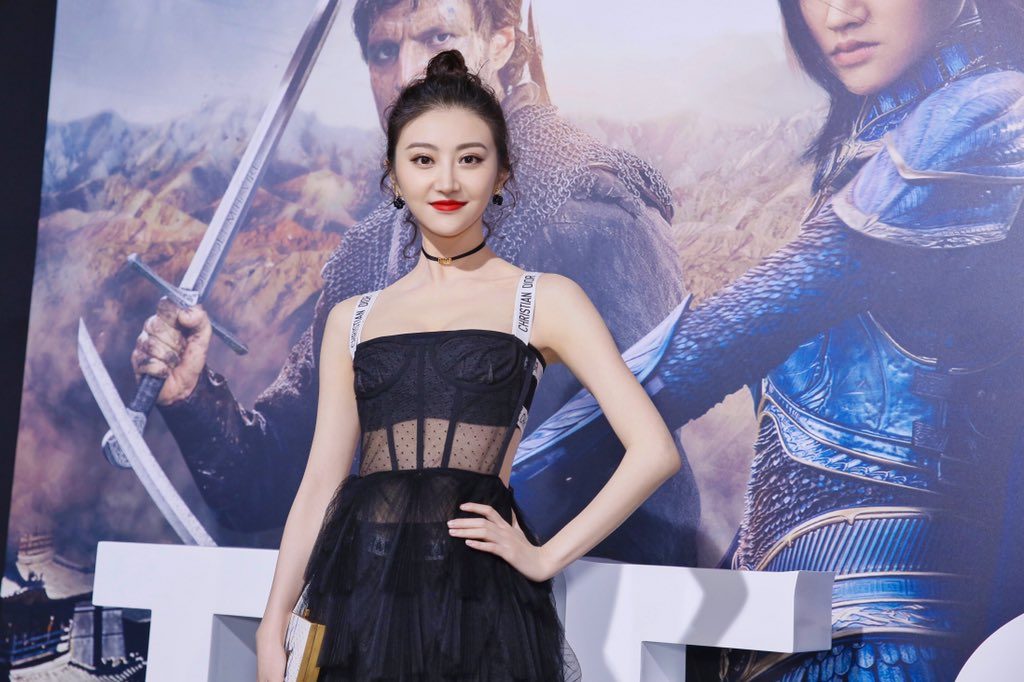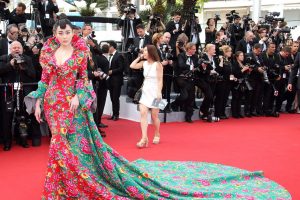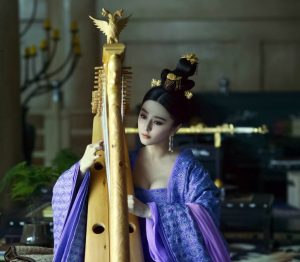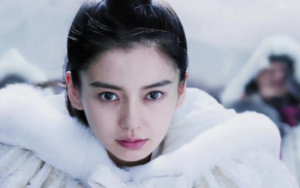
In the last few years, 28-year-old starlet Jing Tian has ascended with unusual speed into the white-hot center of China’s entertainment world. After studying at both the Beijing Dance Academy and the Beijing Film Academy, both reliable feeders into China’s show business ecosystem, she spent relatively little time working her way up via supporting roles and television series before finding herself thrust into the spotlight alongside stars like Sun Honglei, Jackie Chan, and Chow Yun-Fat.
When Legendary Entertainment began production on its megabudget US-China co-production, The Great Wall, Jing was chosen to star opposite Matt Damon as a woman warrior commanding a vast army against fearsome supernatural monsters. Evidently, someone at the studio liked what they saw: before the film was finished, Jing was slotted into Legendary’s blockbuster titles, Pacific Rim: Uprising and the just-released Kong: Skull Island, immediately lifting her to heights of international visibility above Tang Wei, Fan Bingbing, Zhou Xun or nearly any of China’s other well-established superstar “Heavenly Queens.”
Naturally, Chinese filmgoers are wondering what’s up. And in the vacuum left by the lack of a reliable independent press, Chinese gossip, with its penchant for detailed embellishment and invasive speculation can make TMZ look like The New York Review of Books. Add the Internet into the mix, and it goes to the next level, a web of conspiratorial, celebrity-denigrating innuendo that is wildly judgmental, sexist, and almost impossible to respond to.
Since one of the main things Hollywood producers look for in a crossover superstar is fluent English, we can say with near certainty on the basis of her stilted delivery in The Great Wall that Jing’s elocution is not a factor in her getting Hollywood gigs. Jordan Vogt-Roberts, the director of Kong: Skull Island recently told the Singapore Straits Times that working with Jing was difficult in large part because of her limited English, and that her role in the film had to undergo significant cuts.
Of course this doesn’t mean she’s untalented or without potential, but Jing has now become an urban legend, someone about whom everybody “knows” “the real story.” Of course, what they know is unknowable, contradictory, and impossible to verify (if not just plain impossible). And what is it they know? Herewith, straight from the Chinese Internet, a translated and summarized selection of the most widespread explanations for Jing’s rapid rise:
Theory 1: Jing Tian’s long-time boyfriend is a Wanda shareholder
According to the Internet portal Sohu’s entertainment channel, Lu Zheng, the founder and chairman of Beijing Starlit Movie and TV Culture has cast Jing in many of the films he’s financed, including the 2011 release, The Warring States. Information on Lu is scarce, but he’s said to be a shareholder of the Dalian Wanda Group, the real estate/showbiz behemoth that purchased Legendary Entertainment last year. In an interview, Jing once said her boyfriend encouraged her to get into acting, and that “I wouldn’t know what I’d be doing if it weren’t for him!”—stopping short of naming said boyfriend. The gossip mill took care of that: Lu.
Theory 2: Jing Tian is the secret daughter of Wang Jianlin
HK01, a Hong Kong-based news outlet reported rumors suggesting that Jing is related to Wanda founder and chairman Wang Jianlin, China’s richest man. On Mother’s Day 2013, Wang’s son, Wang Sicong, posted to his Weibo account a photo of himself at age two, seated between two little girls, one of whom Chinese netizens were quick to point out bore a strong resemblance to how Jing might have appeared as a toddler. The tycoon’s son, who now works for his dad at Wanda, tagged the photo with a Weibo handle belonging to a woman who, as an adult, also looks a lot like Jing. This thin chain of evidence convinced much of the Chinese Internet that the little girl pictured in the Mother’s Day post might be either Wang Jianlin’s niece or his secret daughter.
Theory 3: Jing Tian is a vessel for laundering money
WeChat public account user “IChinar” argued that she “followed the money,” alleging that both Beijing Starlit Movie and TV Culture (see Theory 1) and Xi’an Suobao Film and Television—both investors in films in which Jing starred—are laundering money for Wanda. The logical extension of that thinking is that she gets cast in co-productions and paid millions in U.S. currency, but that some of that money is simply offshored to America at a time when Beijing is cracking down on capital flight. “IChinar” claims that not only is the source of these alleged money-laundering production companies’ funding unknown, but also that they happen to share the same registered address: an office inside Wanda Plaza in Beijing.
Separately, in 2014 actor Sun Honglei bluntly stated that he felt “raped” by a poor-quality production he starred in, criticizing “some nouveau-riche film investors who finance productions solely for the purposes of courting actresses and money laundering,” which, he said, was how the reputation of a film was sure to get ruined. Though Sun did not specify to which film he was referring, netizens quickly stepped in to fill in the blanks, pointing to The Warring States, in which Sun had co-starred with Jing.
Theory 4: Jing Tian is a movie star by government decree
WeChat conspiracy-spinner “IChinar” has also said that the real reason behind Wanda’s effort to propel Jing’s rise to stardom is not profit-driven at all. What Wanda really wants are the rumored connections she has by blood, with an unnamed high-ranking Party official who has decision-making power in fields of culture, film, and television. Asked independently, a veteran Chinese journalist repeated this same theory, requesting that they not be named. The sensitive nature of this particular line of speculation is clear: the original post to this effect by “IChinar” was censored from the Chinese Internet, but was captured and preserved by Chinese media watchers at China Digital Times in Berkeley.
Asked to comment on the speculation concerning Jing’s rise and the challenges of representing a client to whom such feverish curiosity has lately attached, a representative at Slate PR in Los Angeles emailed, saying, “Each of those four theories is completely false.” Jing’s representatives at Beijing Starlit Movie and TV Culture in Beijing and Los Angeles, and her agents at the Creative Artists Agency in Beijing and New York, did not respond.
— additional reporting by Sophie Wu
[updated 3/28/17 at 1:05 pm to reflect statement from Jing’s PR representative]





